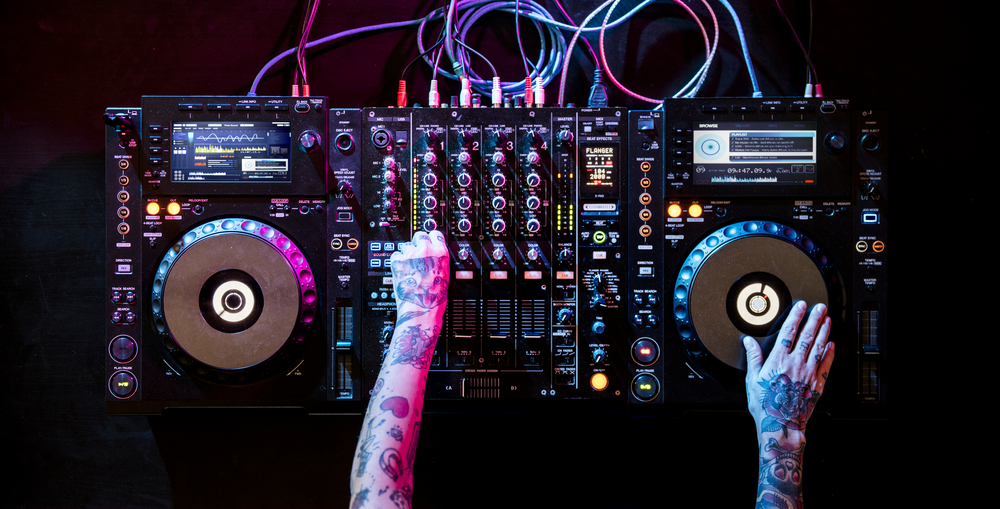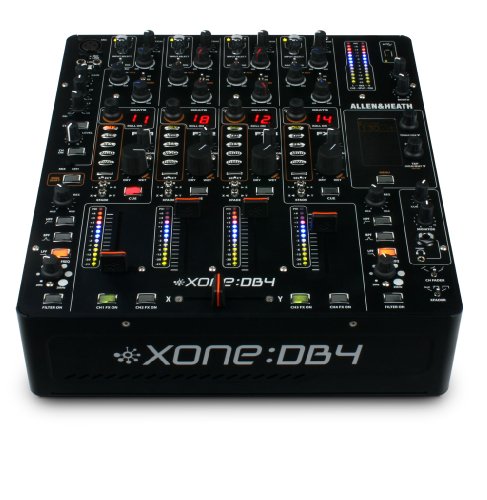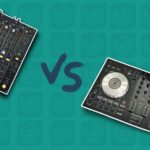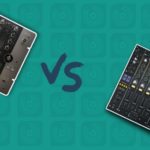DJ Mixers are the core element of any DJ booth - you’re not going to get very far without one! Without a mixer, your setup may as well be a home music system as it is mixers that let DJs mix and manipulate the tracks in their list.
As they are so integral to your set up, mixers are a necessary piece of equipment and choosing a mixer isn’t a decision to be taken lightly.
But with so many excellent mixers out there meeting all kinds of different needs, how do you know which is the best mixer for you?
Below you’ll find seven of the best DJ mixers on the market, as well as the information you’ll need on finding the best mixer for you, as well as the answers to some frequently asked questions. Let’s get into it!
OUR TOP PICK
Allen & Heath Xone:96
With a liberating analog design and a 6+2 channel layout, the Allen & Heath Xone:96 is one of the most popular mixers on the market and is Traktor Scratch Pro 2 certified.
There are two independent USB connections that both offer 6 stereo inputs and outputs.
The Xone:96 has two independent headphone cueing systems, and a range of Dual Xone VCF filters and crunch distortion to experiment with.
But while these are definitely handy features, some might want more than two external channels to access.
Pros
- Brilliant analog/digital design and simple layout.
- Internal sound card.
- Comes with Xone filter.
- Reliable headphone jack.
Cons
- Pretty basic.
- Only has basic filter effects and only 2 external channels.
EDITORS CHOICE
This battle mixer from Rane is packed with features and will definitely stand the test of time, thanks to its die-cast aluminum FX paddles and 180-degree rotation functionality.
The Rane Seventy-Two also has a 4.3-inch touchscreen for managing your wave display, and an X/Y control along with user customizations and song selection.
The dual Flex FX engines and stacked Serato FX gives you an unrestricted performance, and full on-board Serato DJ pro transport and pad control.
However, the on-screen events can be pretty overwhelming, and this is certainly one of the more expensive mixers on this list.
Pros
- High-quality design.
- Packed with effects such as Fader FX, Touch FX, Internal Flex FX, and more.
- Incredible RANE mag-three adjustable magnetic fader.
- Dual USB ports improve changeovers.
- Plenty of pad and performance functions.
Cons
- Not budget-friendly.
- The number of effects can be overwhelming to manage at times.
BEST VALUE
The Numark Scratch is a budget-friendly DJ mixer that doesn’t cut corners. It has a very durable feel and provides high-quality DJ software alongside two channels of excellent audio.
Its versatility is also very impressive, and the multitude of buttons and knobs gives it a futuristic and stylish look. The Numark Scratch is packed with features such as an Inno-fader crossfader that allows reverse and slope control.
As well as being budget-friendly, this mixer is user-friendly too, instilling you with confidence to experiment. However, this mixer does only have four pads on each side which is rather inconvenient.
The customization offered by the Numark’s software is impressive, letting you reconfigure layouts to no end. But despite its user-friendliness, I do feel this would be better suited to a more experienced DJ.
Pros
- Has 2 channels of 24-bit audio.
- Has 6 built-in effects.
- User-friendly.
- Has a stylish and futuristic design.
Cons
- Doesn’t come with a separate AUX.
- Only has four pads on each side.
RUNNER UP
If you’re after a mixer that is compatible with Traktor then you’ll love this mixer from Native Instruments.
It comes with a sturdy and reliable aluminum chassis and intuitive controls for Flux and Macro modes. This mixer also has a scratch time code for vinyl and CDs, and has plenty of functionality.
This is an excellent mixer for those who like to experiment with their Traktor software, as well as a great mixer for beginners who need a compact mixer that lets them jump right in with ease.
Pros
- Made with a sturdy and durable aluminum chassis.
- Has 2 standalone channels and 2 remix channels.
- Intuitive control of Macro FX.
- Comes with Flux Mode.
Cons
- Quite limited functionality.
- Only suitable for Traktor DVS.
RUNNER UP
An exciting and versatile piece of equipment, the Behringer Pro Mixer performs fantastically and has a convenient setup that couldn’t be easier to use.
There are plenty of customizations to choose from, and the low-noise setup is so user-friendly that even if you’re a beginner using this mixer, you’ll feel like a pro!
In fact, I would say this Behringer mixer is well-suited for beginners learning how to make the most of their DJ equipment and effects.
However, the knobs on this mixer do let it down a little as they can be inconsistent, and the faders are a little temperamental too.
Pros
- Fantastic sound quality and ultra-low noise.
- Plenty of input options.
- Multiple music effects to choose from.
- Ultra-glide faders.
- The monitor makes multitasking easier.
Cons
- Knobs can be inconsistent.
- May experience some issues with the faders.
RUNNER UP
This advanced DJ mixer from Allen & Heath is sure to meet all your mixing demands, offering you 12 individual stereo inputs and a heavy-duty aluminum chassis that is rugged yet lightweight.
It can be quite intimidating at first glance, but the sound quality is excellent and there are plenty of blends, drops, swells, and transitions to choose from.
However, the resonance is a bit weak, and you can only deactivate and reactivate the split cue on the DB4 on the fly by going into the settings.
This mixer is ideal for those looking for a powerful mixer with plenty of inputs and lots more functionality.
Pros
- Has 4 separate audio channels.
- Has 12 individual stereo inputs.
- Lightweight but durable aluminum chassis.
Cons
- May not be beginner-friendly.
- Requires you to go into settings to deactivate/reactivate the split cue.
RUNNER UP
You may have already heard of Numark, as they are known for producing some of the best high-quality DJ equipment around. Its sleek and responsive controls appeal to both beginners and experienced DJs alike.
The M6 USB DJ mixer is no different, and comes with all the cutting-edge technology and brilliant functionality you could ask for.
The M6 also has more flexibility and versatility than your average entry-level mixer thanks to its four channels.
However, the M6 is a large and hefty piece of equipment, so may not be the most suitable mixer for those on the go.
Pros
- The 4 channels provide more mixing versatility and freedom.
- USB connectivity allows plug and play performance.
- Comes with microphone input.
- Excellent range of controls.
- Good sound quality.
Cons
- Not portable.
- Quality controls and dials are average.
- Lack of effects and cross-fading smoothness.
Buyer’s Guide
Now that we’ve looked at a few of the best DJ mixers, let’s take a closer look at the features of a DJ mixer and what you should expect from one.

A mixer is what gives you access to various components of your software. Depending on what mixer you buy, you’ll find that some of these tools are designed for specific software programs, while others have more wiggle room and can be used with multiple programs.
A key aspect of your mixer is the cross-fade functionalities that let you smoothly fade in and out of effects. In order to do this as smoothly as possible, you’ll need a 3-band EQ at least.
The more expensive mixers are pretty extensive and have plenty of diverse tools to choose from. They are often more complex to use, however, and are better suited for more experienced DJs.
But as you can see above, there are also lots of mixers that are beginner-friendly. So what are the important features you’ll need to look out for when buying a mixer?
Channels: An important question to ask yourself is how many channels are you going to need? Most mixers have at least two channels, which means you can plug in two different audio sources.
There are also mixers that have four channels, and these are particularly appealing to more experienced DJs.
Effects: This is what lets you experiment with your music sounds, and your mixer’s effects will usually include cross-faders, EQ, headphone jacks, and volume controls.
Other effects include things like USB connectivity to plug in your filters, tools, and integrated audio interfaces. However, the more features a mixer has, the more expensive it will be.
Software: Some mixers will come with software, or will be more compatible with a particular brand of software. Meanwhile, some will be able to work with any software you like.
So with all this in mind, how do you determine what the best DJ mixers are? This all depends on your individual needs. I mentioned above that DJ mixers will commonly give you two input channels that you can blend using level controls and cross-faders.
The audio is then delivered to a main output and a cue headphone output that lets you hear the track you’re creating.
More experienced DJs may want a mixer that offers more channels, and on pricier mixers you’ll find four or more input channels. Figuring out the many ins and outs or I/O you’ll need is an important part of finding the best mixer for you.
More I/O means your mixer is more versatile and likely to stand the test of time. But they are also more expensive, and you’re less likely to be able to jump straight into mixing, as you’ll need time to figure out how everything works.
If you’re a beginner and still figuring out the basics, you won’t need more than two channels. But there are other things to consider.
Durability: A well-made mixer that you can rely on is crucial. The best devices are ones that can handle any environment, and you can easily integrate into your set-up.
Effects: I may sound like a broken record here (no pun intended) but effects really are so important. Most DJ mixers will come with some kind of channel EQ and a low.high pass filter. More expensive monitors will come with additional effects too, like One-shot FX, phasers, rhythm delays, and more.
Pricing: DJ mixers come in all shapes and sizes, and those that are intended for professional DJs will be more expensive. It makes sense that the more features you need, the higher the price tag will be. However, some brands will be more expensive than others.
Purpose: It may seem like an obvious question, but, what do you want to do with your mixer? Do you need something that’s compatible with your favored software? Or do you need something basic for mixing CDJs and two channels?
Knowing what you intend to use your mixer for will make the buying process a lot easier.
How Many Styles Of DJ Mixer Are There?
Before you start shopping around for a mixer, it’s good to know what style of mixer you’ll need for your set-up. Mixers come in many styles to support different set-ups, and knowing exactly what kind of mixer you’ll need will make shopping for one a little less confusing.
Digital DJ Mixer: Digital mixers work by taking an electrical signal and transforming it into a numeric representation. This lets you split the sound into different frequencies and organize it using a computer software system.
Digital mixers are essentially an extension of your laptop, and they require computer hardware in order to operate.
Analog DJ Mixer: A more traditional kind of mixer, an analog mixer doesn’t have a digital conversation process, meaning you don’t need a laptop to set these mixers up.
The warm, natural sound produced by an analog mixer makes them popular among record collectors. Analog mixers are also easy to use, and are compatible with most DJ software if you require some extra effects.
Vinyl turntables can also be easily plugged into an analog mixer. They also tend to be cheaper than their digital counterparts.
Scratch DJ Mixer: Another question to ask yourself when looking for a mixer is if you want a regular, or ‘normal’, mixer or a scratch mixer. Scratch mixers are more focused on cross-fading functionality.
They have a strong crossfader that lets them cut scratch audio in and out of your music quickly and precisely. Basic mixers do have cross-fading capabilities, but they’re no match to the capabilities of a scratch mixer.
They’re also refreshingly simple devices. A mixer with a lot of features can be quite overwhelming, and so the stripped-back nature of both scratch mixers and regular mixers make them good options for beginners.
However, unless you’re interested in scratch mixing, you’ll find the same functionality on a regular mixer.
Frequently Asked Questions
What Should I Have For A Beginner DJ Setup?
There are a few essentials you’ll need for your beginner DJ setup. As well as the mixer, you’ll need audio sources, and this will usually be in the form of two different turntables - these will be the two channels that feed into the mixer.
If you’re playing to an audience, you’ll need speakers, and a way to check the audio. You can either do this with a small stage monitor or headphones.
A stereotypical image of a DJ is somebody wearing one headphone on their ear while the other is resting behind their ear. This is so they can hear what the audience is hearing as well as what’s going on in both audio channels.
What Is The Difference Between A DJ Controller And A DJ Mixer?
Yes, DJ controllers are different to DJ mixers, and each come with their own unique features. The main difference between a DJ controller is the design.
Some DJ controllers mimic the whole setup, so they may be linked to a piece of software, so you can virtually control two turntables, rather than physically including different turntables with their own inputs and outputs.
A DJ controller often needs software, and works in tandem with a laptop. DJ controllers may be easier to set up than a mixer, but both have their advantages and disadvantages.
What Is A Rotary DJ Mixer?
Rotary mixers are designed with knobs to control your sound rather than faders. So instead of twisting something, you’re pushing buttons up and down.
Rotary mixers are becoming more popular, as more and more DJs now prefer more natural sounds that can’t really be achieved with heavily digital gear. Many of these products come with HD audio and rather expensive components, making them pretty expensive.
Are Rotary Mixers Better Than Other Mixers?
It all depends on what you mean by ‘better.’ Rotary mixers are becoming more popular, but are still quite niche in comparison to other mixers.
Rotary mixers are especially popular among disco and old-school DJs, and rotary mixers offer a wildly different feel than straight faders.
Fans of rotary mixers also argue that the different approach to level control gives a more tactile response and helps to achieve a more organic mixing style.
But it is inaccurate to say that rotary mixers are objectively better than straight-fader mixers. Rotary level controls don’t automatically make a mixer sound better, but because rotary mixers are favored by audiophiles, it does make manufacturers prioritize sound quality.
We hope you love the products we recommend. We may collect a commission if you purchase through one of our links. This doesn't cost you anything extra. If you do, thank you! As an Amazon Associate, I earn from qualifying purchases.

















